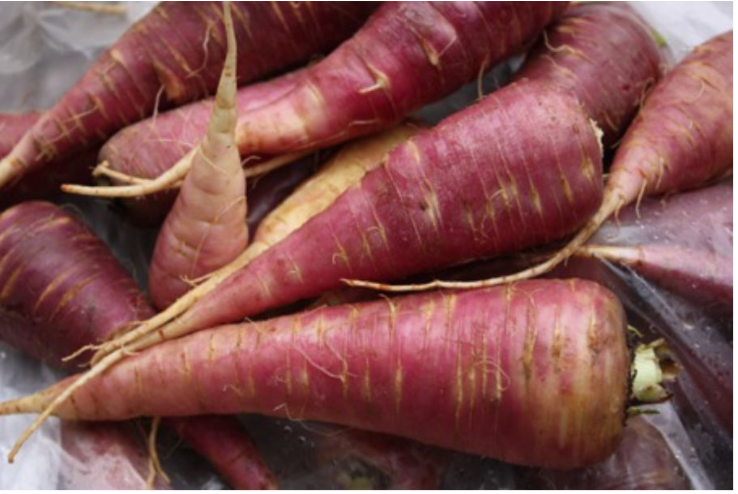Crop: Dacus carota L. (Carrot)
A typical local variety from the canton Ticino in southern Switzerland. In the 1950s it was sold at the Lugano market by old women from Bré. Conical, small to medium carrot. Outside blue-violet, bark deeply coloured, heart white. Low yields, susceptible to Alternaria dauci. Traditionally the carrot was cooked and preserved in vinegar or olive oil with garlic and parsley.
Cultivation System: ND.
Geographical Information
Country: Switzerland
It has been proven that this variety was cultivated in the Malcantone region, in Arosio and Arogno, where it is still partly propagated today.
Farmer(s) description:
In 2005 ProSpecieRara received seeds from various Gniff origins. Unfortunately, the accessions were in a bad condition at that time, probably due to inbreeding symptoms. Also, several accessions featured characteristics not know or expected of the landrace. It may be assumed, that the different lines survived as a garden crop, that was grown by single families in small quantities and sometimes in mixture with other varieties.
Propagation system: Seed, cross-pollination
Multiplication procedures and consequences on landrace diversity:The carrot is a cross-fertiliser and is cultivated biennially for seed production. Crossbreeding with wild carrot is possible. If the carrot had been grown traditionally in small quantities by several families of a region or village, who each let flower some few carrots, the overall population size still would have been enough. But this system became insufficient when the total quantity decreased over time until only single families cared for the carrot in isolated places.
Management plan existence:The ProSpecieRara foundation wanted to save the Gniff carrot by all means, so the breeding and seed producing partner Sativa Rheinau grew several accessions of Gniff since the mid 2000’s. However, after several trials it was concluded that the genetic width of the only population with the right characteristics wasn’t enough to secure the variety. Indications of inbreeding were assumed because of really bad fertilisation. A project then was started to crossbreed with modern carrot varieties of purple colour and to reselect the breeding population into the original variety type. Simultaneously, Sativa Rheinau still tried to multiply the population of the original landrace, and contrary to the assumption it was achieved to get a fertile population of the original landrace again.
Added Values
‘Gniff’ is still very much appreciated on the local market in the Malcantone region. Thanks to the cooperation between Coop and ProSpecieRara, ‘Gniff’ is in discussion for sales in bigger Coop Supermarktes throughout Switzerland. Furthermore, it can be found on farmers’ markets all over Switzerland.
Others (e.g. commercial/geographical brands or special traits):During the European project DIVERSIFOOD, the Gniff carrot and deriving breeding lines were tested for their taste characteristics in collaboration with chefs. A rather rustic taste of low sweetness, with spicy, herbal, earthy flavors was attested to the line of the original Gniff. Due to the genetics from modern varieties, the newly developed breeding lines were rather sweet, but otherwise a bit shallow. Chefs therefore preferred the taste properties of the original Gniff. As such, taste breeding goals of the new lines were defined rather close to the original landrace.
There is no financial support for on-farm conservation of the landrace. The project of breeding treatment by Sativa Rheinau to achieve a new carrot of the same variety type was supported by several projects.
Knowledge and willingness of farmers to maintain the Gniff carrot by themselves are rather low, as long as Sativa Rheinau offers commercial seeds of Gniff. If this engagement should be of no more interest for Sativa Rheinau at any time, the ProSpecieRara foundation will take over the
carrot lines in order to maintain them in the network of private gardeners and semi-professional institutions. Due to the nature of carrot seed propagation, it is rather not feasible for an ordinary vegetable farm.
Seeds are available from Sativa Rheinau.
Contribution by ProSpecieRara, Switzerland.
- Serena M et al. (2014) Das Lexikon der alten Gemüsesorten. AT Verlag
